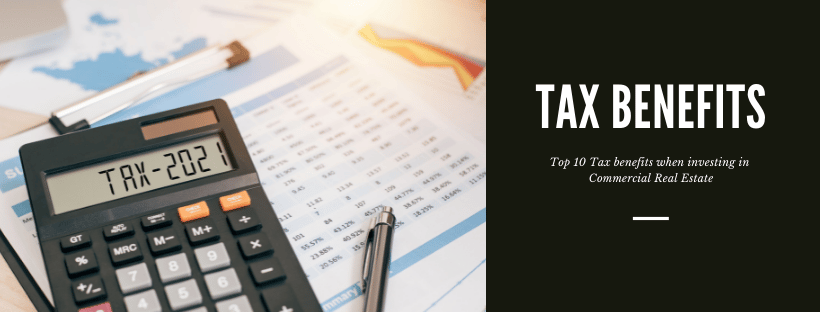Top Tax Benefits When Investing in Commercial Real Estate

Commercial real estate (CRE) is an attractive investment for investors for many reasons, but the tax benefits are a significant draw. Over the course of the life of an investment, these tangible benefits can lead to a substantial difference in returns.
Understanding the tax benefits associated with CRE is a tall order, but if you’re considering an investment, here are eight top commercial real estate tax deductions and credits you should know about.
Tax Deductions in CRE Investing
CRE mortgage interest is tax-deductible
Homeowners enjoy the ability to deduct their mortgage interest on their tax returns – the good news is CRE investors are afforded the same opportunity. When a loan is utilized to purchase commercial real estate, the investor is permitted to write off the amount of mortgage interest paid on the loan each year.
This is especially beneficial for the first few years of the loan when interest payments are higher than the amount paid on the principal. Depending upon the terms of the loan, this tax deduction may be high enough to offset property taxes. To claim this deduction, simply deduct the amount of interest paid over the course of the year.
Property depreciation is a tax benefit
Much like other business assets, commercial real estate properties experience different types of wear and tear over the course of time. As a business or income-producing mechanism, CRE is eligible for a property depreciation tax benefit if the property has been used for revenue-generating purposes for a year or more.
Depreciation is a helpful way to offset taxes owed on a CRE property’s profits. Currently, the IRS sets depreciation for the life of a CRE asset as 39 years, which means investors can claim this deduction for this length of time each year. For instance, if you invested $500,000 for the property, you can claim approximately $12,800 each year in depreciation.
In some cases, investors can take additional larger depreciation deductions over the short term through cost segregation. This involves having professionals look at certain elements of the property to determine if any accelerated depreciation (e.g. a roof or HVAC system) occurs. A very useful tactic for long-term holds. It is important to know if the property is sold at a profit, investors eventually have to pay back the IRS – this is called depreciation recapture.
Non-mortgage expenses are tax-deductible
CRE investors can deduct other expenses associated with the property. This includes property repairs, renovations, upgrades, maintenance costs, and other operating expenses. Since a CRE investment is a business, other expenses, such as the costs associated with traveling to and from the property are also deductible; this includes accommodations and 50% of food and beverage costs.
Other expenses, such as conferences, conventions, seminars, and other continuing education expenses are also deductible. Some investors are also eligible to deduct certain management expenses.
Strategies to Minimize Tax Liabilities
1031 exchange helps avoid depreciation recapture and capital gains
Investors selling one CRE property with plans to purchase another investment can essentially exchange one property for the other to avoid paying taxes with a 1031 exchange. This commercial tax benefit is allowed when investors sell a property and purchase another with equal or greater value. The IRS refers to this as a “like-kind exchange.” With this benefit, capital gains taxes won’t have to be paid until all CRE ownership is sold.
Losses on CRE investments are eligible for deductions
No one invests in CRE with the desire to take a financial loss. However, the U.S. tax code does allow for some investors to deduct certain types of losses they suffer. The amount of deduction will largely depend upon the investor’s income and whether they work in the industry.
Generally, CRE investors making less than or equal to $100,000 a year can take a loss of up to $25,000 against their income. Investors making more than $150,000 a year aren’t eligible for CRE loss-related deductions. Investors considered to be employed in the real estate industry can take an unlimited amount of real estate losses, but to qualify they must have worked at least 750 hours during the tax year and work in this capacity for more hours than any other job they work.
Special Tax Benefits and Credits
Qualified business income deductions (QBI) are a tax benefit
A complex tax deduction, the QBI is a benefit CRE investors may be eligible to take against their income taxes. This benefit is a part of the 2017 Tax Cuts and Jobs Act and is found in Section 199A.
Essentially, investors can claim a tax deduction of 20% of qualifying income, along with 20% of qualified real estate investment trust (REIT) dividends. Specific criteria must be met to qualify. A professional financial advisor can help you navigate this tax benefit by evaluating your circumstances to determine your eligibility.
CRE investors may be eligible for different federal tax credits
Under the U.S. federal tax code, CRE investors are eligible for a number of tax credit programs, including the Low-Income Housing Tax Credit (LIHTC), the New Markets Tax Credit (NMTC), and the Historic Tax Credit (HTC). Not all investors will be eligible for these tax credits and it’s important to keep up with current laws as credits often expire and may be either renewed, discontinued, or changed. A qualified professional can help you determine current criteria and eligibility.
10. Opportunity Zones can yield tax advantages
When the Tax Cuts and Jobs Act of 2017 was passed, the Opportunity Zones program was created as a part of this legislation. This program is designed to spur economic growth and job creation in low-income communities, and CRE investors putting money into these designated zones can receive tax benefits. Currently, the Opportunity Zones program allows investors to defer eligible capital gains until December 31, 2026. A qualified expert can help determine which advantages you’re eligible to receive.
Long-Term Tax Planning in CRE
Use lower capital gains tax rate for retirement planning
Investors who are looking at retirement will find they can enjoy certain tax benefits associated with CRE investing. Sales of commercial properties will come with capital gains. However, these are usually taxed at a lower rate than the gains associated with traditional IRAs—making CRE an appealing retirement option. The earlier one invests in CRE, the better any tax advantages will be.
CRE investments can be passed on to beneficiaries
Many people worry about the tax burden they potentially place on beneficiaries who inherit their assets. A significant benefit of commercial real estate investments is that owners don’t burden their heirs with a large tax bill. Heirs who inherit commercial property and sell it only are required to pay tax on the increased value of the property, as opposed to the actual value of the sale.
For instance, if you buy a property for $2 million and it increases to $3 million, your heirs will have to pay taxes on $1 million, not the $3 million it fetches on the market.
Commercial real estate taxation is complex, but it is worth the effort in pursuing as the tax advantages offered to CRE investors can equate to thousands of dollars – or more – in savings.
To learn more, contact us today.

